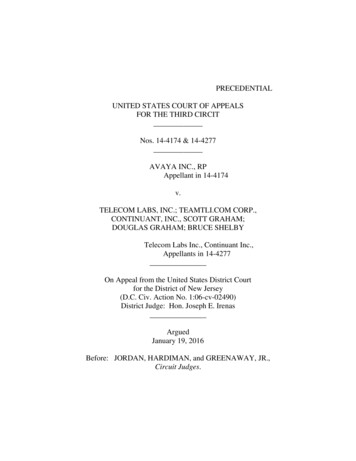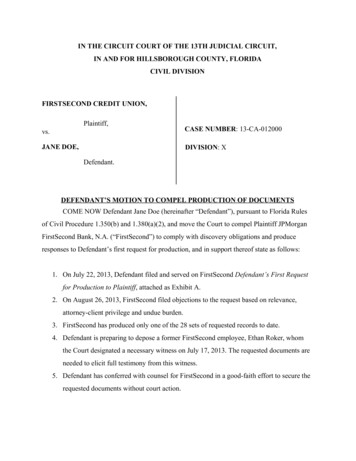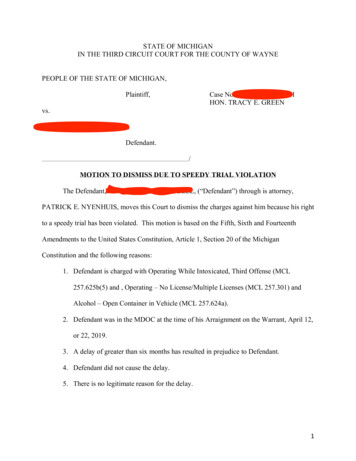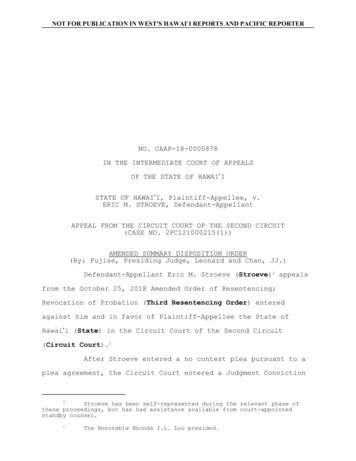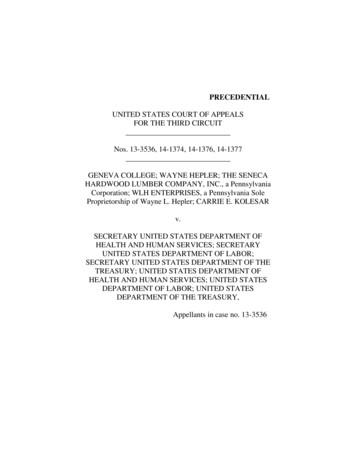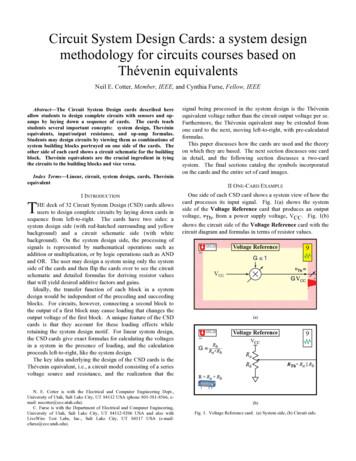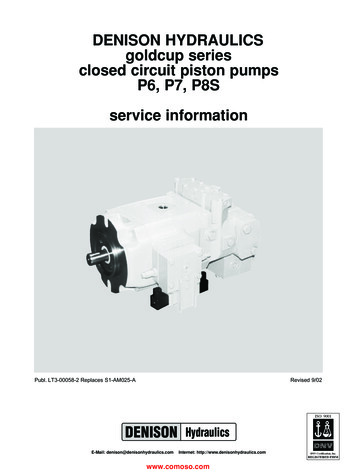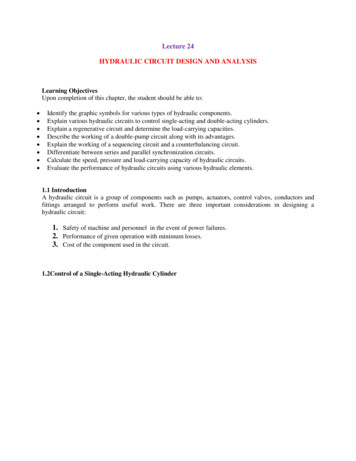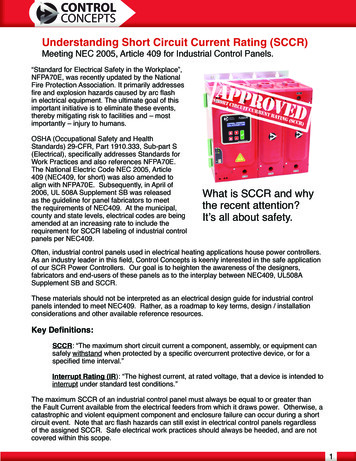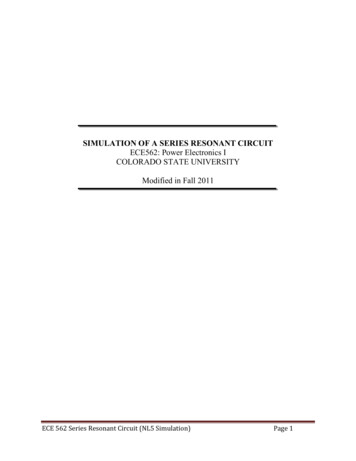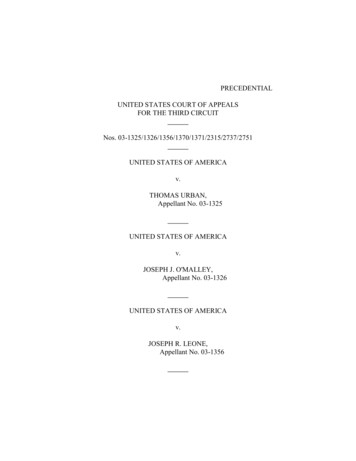
Transcription
PRECEDENTIALUNITED STATES COURT OF APPEALSFOR THE THIRD CIRCUITNos. 03-1325/1326/1356/1370/1371/2315/2737/2751UNITED STATES OF AMERICAv.THOMAS URBAN,Appellant No. 03-1325UNITED STATES OF AMERICAv.JOSEPH J. O'MALLEY,Appellant No. 03-1326UNITED STATES OF AMERICAv.JOSEPH R. LEONE,Appellant No. 03-1356
UNITED STATES OF AMERICAv.GERALD S. MULDERIG,Appellant No. 03-1370UNITED STATES OF AMERICAv.FRED TURSI,Appellant No. 03-1371UNITED STATES OF AMERICAv.JAMES F. SMITH,Appellant No. 03-23152
UNITED STATES OF AMERICAv.WILLIAM C. JACKSON,Appellant No. 03-2737UNITED STATES OF AMERICAv.STEPHEN M. RACHUBA,Appellant No. 03-2751On Appeal from the United States District Courtfor the Eastern District of Pennsylvania(D.C. Nos. 02-cr-00165-13, 02-cr-00165-08, 02-cr-00165-05,02-cr-00165-06, 02-cr-00165-12, 02-cr-00165-11,02-cr-00165-03, and 02-cr-00165-09)District Judge: Honorable Petrese B. TuckerArgued October 28, 2004Before: SCIRICA, Chief Judge, FISHER,and GREENBERG, Circuit Judges.(Filed: April 20, 2005)3
Peter A. Levin1927 Hamilton StreetPhiladelphia, PA 19130Attorney for Appellant, Thomas UrbanF. Emmett Fitzpatrick, Jr. (Argued)F. Emmett Fitzpatrick Law Offices6th and Chestnut Streets926 Public Ledger BuildingPhiladelphia, PA 19106Attorney for Appellants, Joseph J. O’Malleyand William C. JacksonAlan L. YatvinPopper & Yatvin230 South Broad Street, Suite 503Philadelphia, PA 19102Attorney for Appellant, Joseph R. LeoneS. Daniel Hutchison135 North Broad StreetWoodbury, NJ 08096Attorney for Appellant, Gerald S. MulderigNiaLena CaravasosF. Emmett Fitzpatrick Law Offices6th and Chestnut Streets926 Public Ledger BuildingPhiladelphia, PA 19106Attorney for Appellant, Fred Tursi4
David L. McColgin (Argued)Defender Association of PhiladelphiaFederal Court Division601 Walnut StreetThe Curtis Center, Suite 540 WestPhiladelphia, PA 19106Attorney for Appellant, James F. SmithAri S. Moldovsky (Argued)Moldovsky & Moldovsky834 Chestnut Street, Suite 206Philadelphia, PA 19107Attorney for Appellant, Stephen M. RachubaAmy L. Kurland (Argued)Office of United States Attorney615 Chestnut Street, Suite 1250Philadelphia, PA 19106Attorney for AppelleeOPINION OF THE COURTFISHER, Circuit Judge.Appellants, plumbing inspectors employed by the City ofPhiladelphia, were convicted of improperly accepting payments fromplumbers whose work they inspected in violation of the Hobbs Actand the Racketeer Influenced and Corrupt Organizations Act(“RICO”). They raise a host of contentions on appeal, including5
primarily a challenge to the District Court’s jury instruction regardingthe Hobbs Act’s requirement that the covered misconduct haveaffected commerce. We find none of Appellants’ contentionssufficient to support overturning their convictions. We will, however,vacate their sentences in light of the United States Supreme Court’srecent decision in United States v. Booker, 125 S. Ct. 738 (2005), andremand to the District Court for resentencing in accordance with thatdecision.I.Appellants Thomas Urban, Joseph J. O’Malley, Joseph R.Leone, Gerald S. Mulderig, Fred Tursi, James F. Smith, William C.Jackson and Stephen M. Rachuba were plumbing inspectorsemployed by the Construction Services Department (“CSD”), adivision of the Department of Licenses and Inspections (“L&IDepartment”) of the City of Philadelphia. The L&I Department is aregulatory agency charged with construction inspections and businessregulatory affairs. The CSD is responsible for issuing all constructionpermits and performing construction inspections. Appellants weretasked with performing the plumbing component of these inspections,and were expected to enforce the city plumbing code in order, amongother things, to ensure the safety of the city drinking water.Appellants were assigned to districts. Plumbers were required to callthe offices of the district in which their job was located to set up anappointment with an inspector. Appellants had discretion to decidewhen to perform the inspection. In performing inspections andenforcing the plumbing code, Appellants had the power to citeviolations of the code, issue stop work orders on projects, and revokethe license of any plumber who failed to comply with the code.In the late 1990s, law enforcement became aware thatplumbing inspectors were accepting monetary payments from6
plumbers whose work they inspected, or claimed to have inspected.In the course of its investigation into this practice, the FBIinterviewed several confidential sources – designated as CS1, CS2and CS3, respectively – who had worked as plumbing inspectorsalongside Appellants, or as plumbers whose work Appellants hadinspected. An affidavit executed by an FBI agent, filed by thegovernment in support of a request to install hidden cameras in cityvehicles which would be used by suspected plumbing inspectors,detailed statements given by these confidential sources. CS1, aformer plumbing inspector from 1992 to 1997, stated that 70%-80%of the plumbing contractors whose work he inspected during that timeperiod “provided him with a cash ‘tip’ of 5 to 20 in return for hisinspection and for allowing the contractor to work withoutinterference.” CS1 stated that he made an additional 3,000 to 6,000 per year from these “tips,” and that acceptance of “tips” wascommonplace among the L&I Department’s plumbing inspectors.CS1 believed that plumbing inspectors, including specifically manyof the Appellants, “regularly accept[ed] ‘tips’ while working in theirofficial capacity as City inspectors[.]”CS2, a small plumbing contractor who had allegedlyinteracted with plumbing inspectors through a third party, stated thathe provided money used to pay a plumbing inspector named “Tursi”in 1999 and on at least ten prior occasions. CS3, a large generalplumbing contractor who worked with several plumbingsubcontractors, stated that he was told by his subcontractors thatpayments were made to an inspector named “O’Donnell” and hisreplacement named “Smith.” The affidavit also stated that the affianthad interviewed a “cooperating witness” who had “made consensualrecordings of L&I plumbing inspector Fred Tursi allegedly extortingmoney from him.” This cooperating witness advised that he hadgiven 50 to his plumbers to give to Tursi to “keep him off theirbacks.”7
On the strength of this information, the government soughtand obtained from the United States District Court for the EasternDistrict of Pennsylvania an order authorizing the installation ofhidden video cameras in two city vehicles which would be used bycertain of the Appellants while on official city business. Videocaptured by these cameras apparently showed Appellants Jackson,Leone, O’Malley, Rachuba and Smith accepting cash on numerousoccasions from plumbers during the course of conducting inspections;in many instances, Appellants apparently accepted cash paymentswithout performing any inspection at all.On March 19, 2002, a grand jury in the Eastern District ofPennsylvania returned an indictment of 13 plumbing inspectors,including Appellants, charging them with a violation of RICO, 18U.S.C. § 1962, and multiple counts of Hobbs Act extortion, inviolation of 18 U.S.C. § 1951. A five-week trial ensued in earlySeptember 2002. At trial, the government presented evidenceshowing that multiple plumbers made numerous monetary paymentsof varying sizes to each of the Appellants. Plumbers testified thatthey paid inspectors anywhere from 5 to 200 per inspection. Therewas ample evidence at trial that plumbers paid inspectors in order toensure timely and favorable inspections,1 and to prevent unfavorabletreatment or harassment by inspectors. One plumber testified that“We felt like if you didn’t do what was, what had been going on foryears, you certainly would not see, you may not see an inspector1Numerous plumbers testified that because of labor andequipment costs, any idle time between the completion of a projectand the performance of an inspection harmed their business. It wastherefore essential that plumbing inspectors arrive as soon as a projectwas completed, and that they perform the inspection of that project asrapidly as possible so that the plumbers could move on to their nextproject.8
showing up when you want him[,]” while another testified that hepaid inspectors because “[y]ou didn’t want to get on the bad side ofthe inspector.” Other plumbers testified that they paid inspectorsbecause they could not afford to find out if they would be treateddifferently by the inspectors if they did not pay. Plumber RichardClements testified that failing to tip could result in an inspector whowould “give me a hard time, or I wouldn’t get the prompt service.”Yet another plumber testified that when Appellant Tursi asked himfor a larger tip than offered, he complied because “I felt as thoughthere would be some kind of problem if I didn’t do it.”The government presented substantial evidence demonstratingthat Appellants knew that it was improper to accept monetarypayments from plumbers whose work they were inspecting, thusundermining Appellants’ view that they were voluntarily (andtherefore properly) accepting “tips.” Each Appellant was required, atthe time of hiring, to sign an ethics statement acknowledging that hewas not permitted to accept “any offer, any gift, favor or service thatmight tend to influence” him in the discharge of his duties. Everyinspector hired between 1980 and 2000 – including all of theAppellants – was told that it was against city policy for employees totake any cash in any amount at any time. An ethics directive from theMayor of Philadelphia permitted City employees to accept up to 100in gifts per year from any one source, but expressly disallowed theiracceptance of cash in any amount.Evidence of how Appellants accepted the plumbers’ paymentsreinforced the government’s contention that Appellants knew thepayments were improper. Plumbers concealed the payments toAppellants in the pages of their work permit or by folding it up andtransferring the money in what was commonly referred to as a “greenhandshake.” In a conversation taped by a cooperating witness andplayed for the jury, Appellant Mulderig explained that “every time9
they hand me a permit I, I used to fold it over like that and then putit in my pocket, you know what I mean. . when I would go to likeBoston Market or something for lunch I would go in the men’s roomand take it out and put it in my, you know, take the money out ofthere and put it in my pocket.” Moreover, video taken by the hiddencameras in the city vehicles apparently revealed numerous instancesof Appellants surreptitiously receiving the payments and endeavoringto keep the payments hidden.In support of the Hobbs Act’s requirement that anyextortionate conduct have an effect on commerce, the governmentpresented evidence that each Appellant accepted tips from plumberswho purchased supplies made out-of-state, i.e., outside ofPennsylvania. Many of these same plumbers, however, testified thatthe payments they made to Appellants did not affect their ability tomake out-of-state purchases.On October 18, 2002, the jury convicted all Appellants exceptWilliam Jackson of the RICO charges, and all Appellants of theHobbs Act extortion charges. The District Court imposed varyingsentences on Appellants, ranging from twelve months of homeconfinement to thirty-four months’ imprisonment, as well as fines,assessments and probation. These eight, timely, consolidated appealsfollowed.II.The District Court properly exercised subject matterjurisdiction under 18 U.S.C. § 3231. We have appellate jurisdictionover the judgments of conviction pursuant to 28 U.S.C. § 1291, andover the sentences pursuant to 18 U.S.C. § 3742. Appellants raise anumber of challenges to their convictions which we will addressseriatim.10
A.Appellants’ challenges to the jury instructions’ formulation ofthe Hobbs Act’s effect on commerce requirement and thesufficiency of the government’s evidence of such effect.Appellants’ primary arguments on appeal challenge theformulation of the Hobbs Act’s effect on commerce element in theDistrict Court’s jury instructions, as well as the sufficiency of theevidence adduced by the government to prove such effect. TheHobbs Act, 18 U.S.C. § 1951(a), provides:Whoever in any way or degree obstructs, delays, oraffects commerce or the movement of any article orcommodity in commerce, by robbery or extortion orattempts or conspires so to do, or commits orthreatens physical violence to any person or propertyin furtherance of a plan or purpose to do anything inviolation of this section shall be fined under this titleor imprisoned not more than twenty years, or both.18 U.S.C. § 1951(a).In pertinent part, the District Court instructed the jury asfollows on the Hobbs Act charges:You do not even have to find that there was an actualeffect on commerce. All that is necessary to provethis element is that the natural consequences of theextortion – of the money payment, potentially causedan effect on interstate commerce to any degree,however minimal or slight. Payment from a businessengaged in interstate commerce satisfies therequirement of an effect on interstate commerce. Ifthe resources of a business are expended or11
diminished as a result of the payment of money, theninterstate commerce is affected by such payment andmay reduce the assets available for purchase of goods,services or other things originating in other states.Under this instruction, the jury could convict even if it did notfind that Appellants’ extortionate acts actually affected commerce, solong as it concluded that the “natural consequences” of theextortionate acts “potentially caused” just a “minimal” effect oninterstate commerce. The jury was instructed to find this standardsatisfied upon proof of a “[p]ayment” made by plumbers “engaged ininterstate commerce,” which payment “diminished” the plumbers’“resources,” i.e., by proof of a “depletion of assets.”Appellants explicitly challenge the jury instruction’s statementthat proof of a “potential” effect on commerce is sufficient to provethe effect on commerce element under the Hobbs Act, and implicitlychallenge the jury instruction’s statement of the depletion of assetstheory. In Appellants’ view, the reference to “potential” effect isflawed because the Hobbs Act speaks in action verbs – “obstructs,delays or affects commerce” – and conduct which merely has the“potential” to affect commerce does not actually obstruct, delay oraffect commerce. Appellants also argue that after a series of SupremeCourt decisions between 1995 and 2000 construing the CommerceClause, it would be constitutionally doubtful to interpret the HobbsAct as applying to conduct which merely potentially affectscommerce. Appellants further contend that the so-called “depletionof assets” theory – whereby proof that a Hobbs Act violation depletesthe assets of a business engaged in interstate commerce conclusivelyestablishes the effect on commerce requirement – was incorrectlyapplied here in light of the plumbers’ testimony that the paymentsthey made to Appellants did not in fact affect their ability to engagein interstate commerce. We read this latter contention as a challenge12
to both the jury instruction’s formulation of the depletion of assetstheory, and to the sufficiency of the government’s evidence of effecton commerce by way of the depletion of assets theory.To the extent that Appellants challenge the District Court’sinterpretation of the Hobbs Act in formulating its jury instructions, orthe fidelity of its interpretation and instructions to the United StatesConstitution, we exercise plenary review. United States v. Singletary,268 F.3d 196, 198-99 (3d Cir. 2001) (citations omitted); Gibbs v.Cross, 160 F.3d 962, 964 (3d Cir. 1998) (citations omitted). Inreviewing a challenge to the sufficiency of the evidence, we “mustdetermine whether, viewing the evidence most favorably to thegovernment, there is substantial evidence to support the jury’s guiltyverdict.” United States v. Idowu, 157 F.3d 265, 268 (3d Cir. 1998)(citation and internal quotation marks omitted). We “will sustain theverdict if ‘any rational trier of fact could have found the essentialelements of the crime beyond a reasonable doubt.’ Thus, ‘a claim ofinsufficiency of the evidence places a very heavy burden on anappellant.’” United States v. Dent, 149 F.3d 180, 187 (3d Cir. 1998)(citations and internal quotation marks omitted).A comprehensive review of our Hobbs Act precedent over thepast thirty years compels us to reject Appellants’ challenges regardingthe Hobbs Act’s effect on commerce requirement and the depletionof assets theory of proving such an effect. We begin with UnitedStates v. Mazzei, 521 F.2d 639 (3d Cir. 1975) (en banc). Mazzei, aPennsylvania state senator, engineered lease transactions betweenstate agencies and a private entity, B.M.I., Inc., and extorted paymentsfrom B.M.I. in connection with the transactions. He was convictedof two counts of Hobbs Act extortion. Mazzei argued on appeal thatthe government had failed to satisfy the Hobbs Act’s effect oncommerce requirement because although B.M.I. was deemed to beengaged in interstate commerce, the lease transactions which13
constituted the unlawful extortionate acts were local and did notthemselves affect interstate commerce. We rejected this argument,accepting instead the government’s contention that depletion of assetsof an entity engaged in interstate commerce was enough, as “[t]hisposition accord[ed] with our previous holdings that where theresources of an interstate business are depleted or diminished ‘in anymanner’ by extortionate payments, the consequent impairment ofability to conduct an interstate business is sufficient to bring theextortion within the play of the Hobbs Act.” Mazzei, 521 F.2d at 642(citing United States v. Addonizio, 451 F.2d 49 (3d Cir. 1972); UnitedStates v. Provenzano, 334 F.2d 678 (3d Cir. 1964)). We found thatthe facts easily satisfied this standard. B.M.I.’s subsidiaries“purchase[d] materials in a number of states for use in manufacturingproducts sold in almost every state[,]” id., and the payments thesubsidiaries made diminished “funds available to B.M.I. for use in [ ]interstate activities . and its interstate business must to this extent becurtailed.” Id. We “conclude[d] that the Hobbs Act mayconstitutionally be construed to reach the indirect burdens placed oninterstate commerce by the extortionate activities alleged in this caseand that such a construction of the statute accords with Congressionalintent to proscribe extortion which ‘in any way or degree obstructs,delays, or affects commerce.’” Id. (citations omitted).In United States v. Cerilli, 603 F.2d 415 (3d Cir. 1979), weconsidered appeals of substantive and conspiracy convictions underthe Hobbs Act. The Pennsylvania Department of Transportation (the“Department”) leased equipment from private owners in order toperform snow removal, general road maintenance and repairresponsibilities. Defendants were Department employees who hadaccepted bribes from such private owners in exchange for leasingtheir equipment. The government established at trial “that all thelessors had bought fuel for their equipment that had travelled ininterstate commerce[,]” and that most of the lessors “had purchased14
equipment and/or supplies that had travelled in interstate commerce.”Cerilli, 603 F.2d at 423.On appeal, defendants argued that the evidence of interstatecommerce was insufficient to support their Hobbs Act convictions.We disagreed, reiterating that “where the resources of an interstatebusiness are depleted or diminished in any manner by extortionatepayments, the consequent impairment of ability to conduct aninterstate business is sufficient to bring the extortion within the playof the Hobbs Act.” Id. at 424 (quoting Mazzei, 521 F.2d at 642)(other citations and internal quotation marks omitted). We continuedthat “[a]ll that is requ
Philadelphia, wer e co nvic ted of improper ly acc epting pay ments from plumbers whose work they inspected in violation of the Hobbs Act and the Racketeer Influenced and Corrupt Organizations Act (“RICO”). They raise a host of contentions on appeal, including . the license
